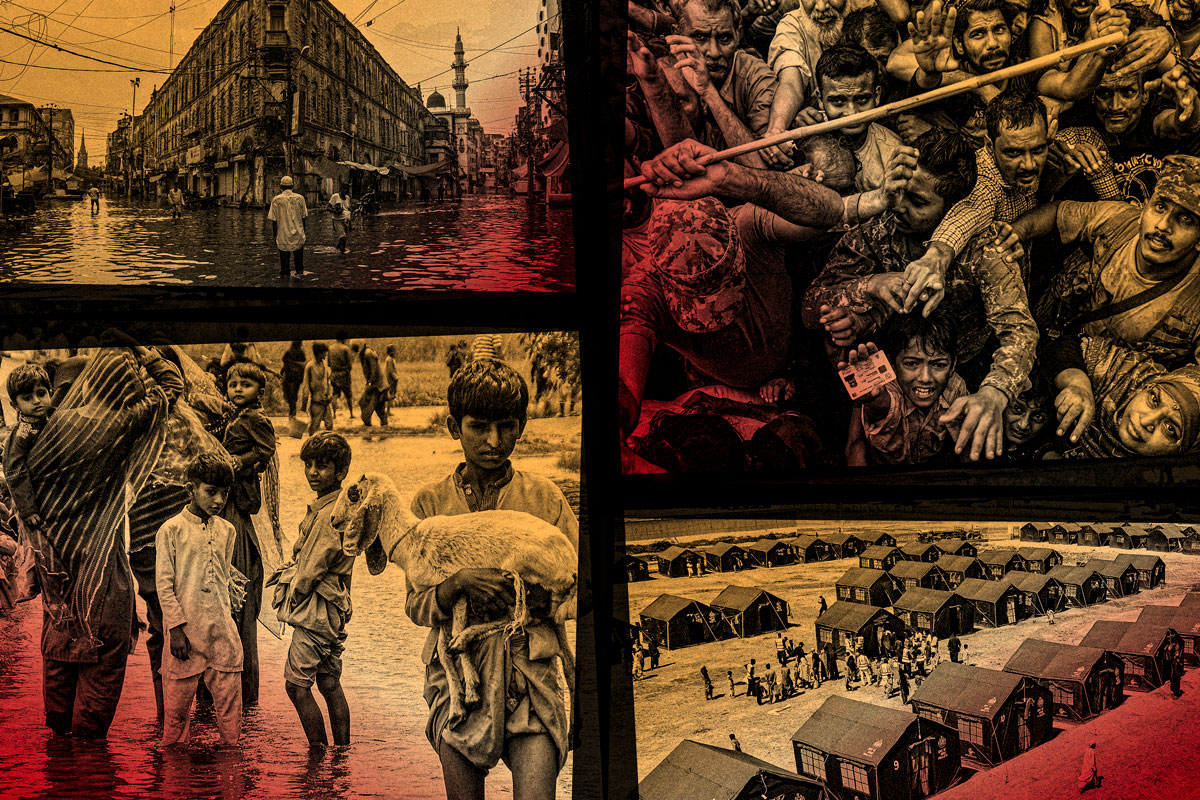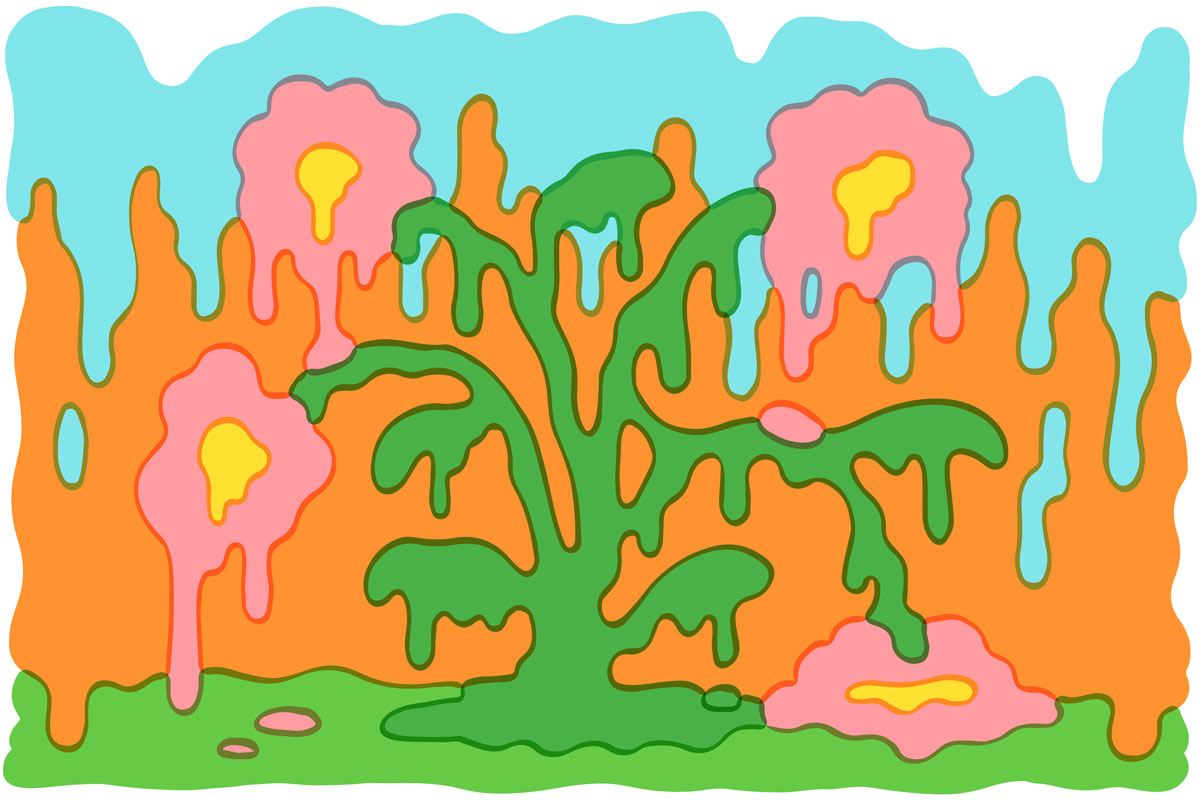By this time, most people have seen the disastrous footage from Pakistan. The global news reports have all intoned the same grim litany of facts: after a relentless onslaught of rain and glacial melt, one third of the country is still under water, more than 1200 Pakistanis have died, and 33 million people are affected by the catastrophic floods. The dire fallout from acute climate change is no longer what counts as breaking news in the western press—but it is quite noteworthy that a postcolonial nation like Pakistan that is bearing the brunt of this catastrophe.
There is, of course, nothing in Pakistan’s past or present economic profile that should single it out for this calamity: the country is one of the lowest carbon emitters in the world—its economy is still largely agrarian. Instead, Pakistan has fallen victim to its own geography: Except for the North and South Pole, Pakistan has more glaciers than any country in the world, centered mostly in the Himalayan and Karakoram mountain ranges. The floods now attracting millions of shocked viewers on Instagram and TikTok are the consequence of record-setting glacial melt. According to Pakistan’s chief meteorologists, the volume of glacial runoff is increasing by record levels every year. This onrush of water has triggered a vicious cycle of flooding: Rivers overflow their levees—or else the dams containing them break. The country’s crops, homes, and agrarian settlements have all succumbed to the rising tide.
The decades of the war on terror, in the view of most Pakistanis, had brought a dependence on Western aid that an independent Pakistan should rightfully foreswear.
None of this should be counted as news in the strict sense, either. The Global Climate Risk Index ranks Pakistan among the top ten countries most affected by extreme weather events. The index also notes that in March and April, the southern portion of the country—including Karachi, the city of 18 million where I am from—had begun to experience temperatures as high 118 degrees Fahrenheit. In June, Jacobabad, a smaller city not far from there, logged one of the highest temperatures on record at 126 degrees.
The devastation Pakistan is now suffering, in short, must be placed in the broader context of climate justice for the global South. Pakistan is now effectively paying for the excesses and environmental indifference of the far wealthier Western world. Throughout the modern industrial age, the colonial periphery exported cheap resources and raw materials to the industrialized west—now, impoverished postcolonial nations are paying the brutally unfair costs of climate destruction engineered by their former colonial oppressors.
These broad conditions of environmental catastrophe have created their own regional ideological rivalries—bearing the toxic imprint of the global rush toward authoritarian strongman rule. Indeed, Pakistan itself is suffering through its present crisis as it continues to weather a fresh battery of quasi-fascist assaults from Narendra Modi’s India. Unlike Pakistan, India is one of the world’s highest carbon emitters; but in lieu of any honest reckoning with such wealth-and-climate-based disparities, India’s prime minister relentlessly feeds anti-Muslim hysteria within his country—and trains the same sentiment on Muslim-majority Pakistan.
Regrettably, Pakistan has also been convulsed with much the same brand of confrontation-minded (and content-challenged) cultural rhetoric in its own centers of power. The country’s perennially squabbling political class has reliably shown less interest in responsible governance than in appropriating ever more for itself in alternating grabs at power. One theme this rotating cast of leaders has exploited is the deep unpopularity of he “international community” in Pakistan-in the past five years, particularly since the withdrawal of the United States from Afghanistan, Pakistan had been trying to turn away from the Western world. In 2018, the country’s leaders banned 18 international NGOs. The organizations were mainly human rights concerns seeking to monitor state excesses but the ban gained a great deal of popular support as a symbolic rebuke of Western powers. The decades of the war on terror, in the view of most Pakistanis, had brought a dependence on Western aid that an independent Pakistan should rightfully foreswear.
This decision created a vacuum in global aid directed to Pakistan that China eagerly filled. The rising Asian superpower lent billions of fresh capital via well-funded Pakistani development programs such as Belt and Road Initiative, while continuing to lavish resources on the China Pakistan Economic Corridor. Imran Khan, the former cricketer who headed Pakistan’s parliamentary coalition government until it collapsed earlier this year, played along, and supplied a steady stream of de-colonial slogans to help shield his own illiberal power grabs.
The transformation of liberal institutions so that they no longer serve as vehicles of white supremacy and neocolonial subjugation is urgent and necessary.
In light of these developments, it’s not all that surprising to see that the traditional neoliberal aid organizations have been more than a little laggard in rallying to Pakistan’s present crisis. UN Chief Antonio Gutierrez promulgated a video statement on the catastrophe—but he termed it a “monsoon on steroids,” which mischaracterized and downplayed the unjust climate disparities responsible for the flooding. On August 30—three days after the floods hit—Matthew Saltmarsh, the spokesperson for UN’s High Commissioner for Refugees admitted that only $1.5 million of the ambitious $160 million UN rescue plan had actually been delivered. Around the same time, Pakistan’s recently appointed finance minister announced that the IMF had decided to release $1.7 billion in funds meant to normalize Pakistan’s economy.
This outlay was not earmarked for disaster relief—but political observers in Pakistan greeted it as a welcome effort to mend relations with the international aid community at a moment when the country needs all the emergency assistance it can get. Inevitably, though, such arrangements are stopgap measure, viewed against the backdrop of the climate reckonings ahead. Critics of liberal internationalism such as Jason Hickel have argued that the present crisis cries out for reconceptualizing rescue initiatives in Pakistan as “climate reparations” rather than conventional aid. I sympathize with this argument, which points correctly to the direct responsibility that the international community and polluting Western nations share for the glacial melt that has caused this catastrophe. Yet arguments by themselves cannot provide disaster aid. And so long as the liberal leaders who control these disbursements and initiate rescue and relief efforts are uninterested in them, countries like Pakistan remain in peril.
By the end of this catastrophic week, the World Health Organization was cautioning that the millions left stranded in flooded areas were facing serious risk of water-borne diseases. There is no doubt that this will vastly increase the casualties from the flooding.
Such prospects are a stark reminder that, for all its glaring historical failures, internationally minded liberalism remains the framework of materially significant—and urgently required–aid disbursement at least over the near term of the climate crisis. At the same time, the critique of liberal Western privilege—and particularly the exposure of the hypocrisy of liberalism when it comes to improving material conditions of life in the global South—is an indispensable resource in the struggle toward true climate justice. In her essay “Towards an Anti-Racist Humanitarianism in the Post-Liberal World” Oxford geography scholar Patricia Daley writes: “The urgency of a planetary humanity consensus to tackle a range of climate-change induced environmental crises requires moving beyond Western liberal humanitarianism.”
Indeed, the transformation of liberal institutions so that they no longer serve as vehicles of white supremacy and neocolonial subjugation is, as Daley writes, urgent and necessary. But the thorny problem of the moment is how the Global South should propel that change—and what those suffering from the vagaries of Western and white-supremacist excess must do in the meantime.
Rafia Zakaria is the author most recently of Against White Feminism (W.W. Norton, 2021). She is also a columnist for The Baffler and Dawn (Pakistan).



